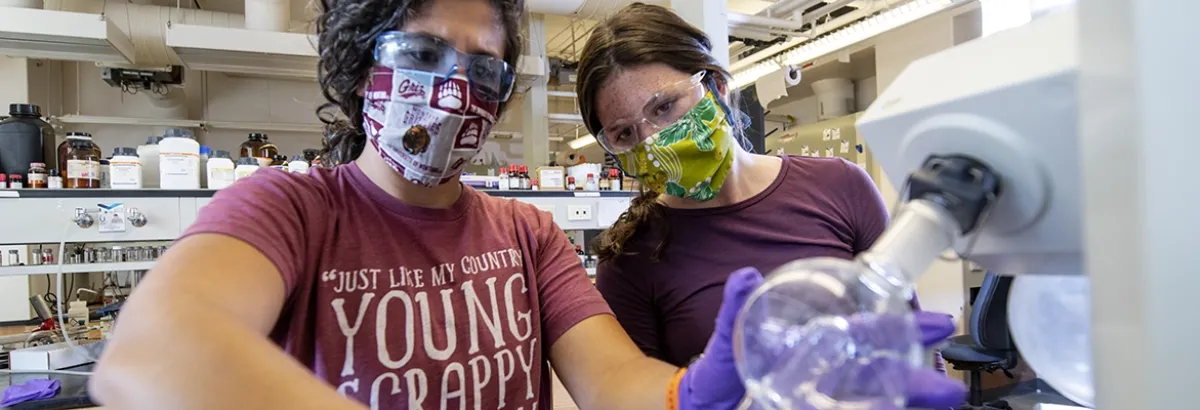General Information
-
UMCUR provides Ñý¼§Ö±²¥ with a venue to translate their projects and their importance for diverse audiences. Presenters and performers should assume audience members have varying knowledge about project topics. Technical terms and other key aspects that might be unfamiliar to some audience members should be clearly explained.
-
All presenters/performers will choose a project category when they submit their abstract/artist's statement. These categories are used to group similar projects together. The five categories (with examples of associated topics) are:
- Humanities – e.g., ancient and modern languages, literature, philosophy, ethics, history and art history, law, religion, journalism, communication, critical and theoretical approaches to the arts
- Life Sciences – study of living things, e.g., ecology, biology, botany, wildlife biology, microbiology, genetics, physiology, neuroscience, biochemistry, paleontology
- Physical Sciences – e.g., astronomy, physics, chemistry, meteorology, geology
- Social Sciences – e.g., anthropology, archeology, economics, political science, psychology, sociology
- Visual and Performing Arts - presentations focused on student-created arts; e.g., music, drama, dance, film, art, sculpture, fiction and non-fiction writing, poetry, etc.
- Franke Global Leadership Initiative (GLI) - Ñý¼§Ö±²¥ enrolled in the GLI certificate program (regardless of topic).
-
Students can select from one of the following project types:
- Oral presentations: Presenters will be placed in a session with 3-5 other speakers and will have the option to use slides during their talk. Oral presentations are a good option if you (1) have a detailed project to move the audience through; (2) are comfortable with or seeking practice giving professional talks; and (3) would like to engage with many people at one time.
- Poster presentations: Posters are a common way to present scholarly work at professional conferences and provide a visual and textual representation of your work. A poster presentation can be a good option if you (1) would like to engage in more informal, one-on-one conversations; (2) have visually complex information or very technical information; and/or (3) have a project in its early stages or are seeking suggestions and multiple conversations.
- Visual and Performing Arts: Students exhibit or perform creative work, including reading poetry/creative writing, performing music, showcasing photography or artwork, or performing choreography.
-
The deadline to register for UMCUR 2025 is Friday, February 28, by 11:59pm. (An abstract or artist's statement is submitted as part of your registration.) The is open for UMCUR 2025!
Find more information about key dates and responsibilities on the Important Dates page.
-
To participate in an academic conference, such as UMCUR, it is expected that Ñý¼§Ö±²¥ prepare an abstract or artist's statement, which is a brief project description. All submissions will be included in the ScholarWorks UMCUR repository unless otherwise requested.
All UMCUR abstracts and artistic descriptions should be 200-250 words and should be accessible to a multidisciplinary audience. These project summaries must be reviewed and approved by your faculty mentor. Each student will be asked to confirm that their mentor approved the abstract or artist's statement during the registration process.
Each abstract or artist's statement is submitted through a portal on ScholarWorks during conference registration. For guidance on writing your abstract or artist's statement, make an appointment with the Writing Center.
-
Students interested in learning more about writing an abstract or artist's statement can choose from several workshops hosted by the Office of Undergraduate Research. You can also talk with your faculty mentor about suggestions, or make an individual appointment with the Writing Center.
For more information about UMCUR workshops and to review abstract and artist's statement resources, visit the Resources page.
-
In addition to your abstract/artist's statement, you have the option to include a PDF of your slideshow or poster to . Adding these materials can provide additional depth and information to your ScholarWorks entry and makes it easier to share information with graduate schools, employers, and others. Some performers and presenters also may have media files (e.g., audio and video recordings) that can be submitted.
All file uploads must be completed by 10am on Thursday, April 24, in ScholarWorks to be included in the published UMCUR 2025 final program. After the conference, please contact Professor Wendy Walker, if you would like to add your slides/media files to ScholarWorks.
